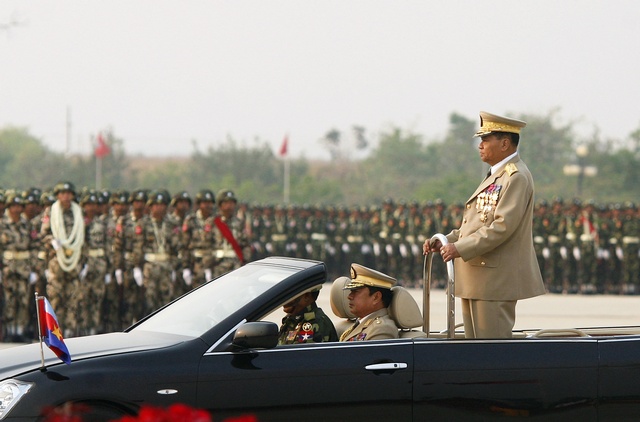 According to organisation’s Reporters Without Borders information, Burma has more than 150 privately-owned newspapers and magazines but they are all subject to pre-publication censorship by the Press Scrutiny and Registration Division, commonly known as the Press Scrutiny Board, which is run by a military officer.
According to organisation’s Reporters Without Borders information, Burma has more than 150 privately-owned newspapers and magazines but they are all subject to pre-publication censorship by the Press Scrutiny and Registration Division, commonly known as the Press Scrutiny Board, which is run by a military officer.
This kind of censorship is virtually unique in the world and prevents the emergence of any editorial independence.
Foreigners not allowed working freely
The international media that broadcast in Burmese – BBC, RFA, VOA and Democratic Voice of Burma (DVB) – have never been allowed to work freely inside the country and have repeatedly been attacked by the military government. Very few visas are issued to foreign reporters.
“Our hands are tied,” a Rangoon-based journalist told Reporters Without Borders. The run-up to the elections – the results of which have already been decided, according to the main opposition party – has been accompanied by an increase in  censorship.
censorship.
The exile magazine Irrawaddy quoted the editor of a Burmese publication as saying: “Three officials normally check our newspaper at the Press Scrutiny Board but, with the elections coming up, each line is now read and re-read by a dozen officials.” He added that additional staff began being assigned to the Press Scrutiny Board in May.
The latest example of censorship is a one-week suspension of the weekly Modern Times for changing the headline of its weather forecast without permission. A well-known forecaster’s article about the possibility of heavy rain in September was given the headline “Will it come in September?” The censors suspected an allusion to the 2007 Saffron Revolution.
The magazine The Voice was suspended for two weeks in July because of an article by Nay Win Maung, a political analyst who writes under the name of Aung Htut, about the powers and prerogatives that the constitution will give the next president. The suspension was surprising because The Voice supports the military government, in particular Maj. Gen. Htay Oo, one of the most influential ministers.
Nay Myo Wei, the leader of an opposition party expected to take part in election, complained in July that an interview he gave to the weekly Pyithu Khit was suppressed by the censors.
Unique state’s censorship
A Burmese journalist explained  that the Press Scrutiny Board does not issue written suspension orders but just gives verbal instructions to suspend publication temporarily.
that the Press Scrutiny Board does not issue written suspension orders but just gives verbal instructions to suspend publication temporarily.
At the same time, the police are continuing to prevent the circulation of any publications that support the opposition. In July, for example, a teenager was arrested in Rangoon in possession of books written by Aung San Suu Kyi, the head of the opposition National League for Democracy, and Win Tin, a veteran journalist who is a member of the National League for Democracy (NLD) leadership.
Within the restrictions imposed by the Press Scrutiny Board, a few publications, the most pro-government ones, have managed to provide some coverage of the preparations for the elections. The coverage is above all limited to the electoral manoeuvring of the generals in the government and the registration of political parties.
Propaganda articles
The authorities also announced in July that the publication of propaganda articles prepared by government writers would be optional. “But the media will have to publish them all the same if the request comes from the highest authorities,” a Press Scrutiny Board official told the New Delhi-based Mizzima News.
The government press, especially The New Light of Myanmar, has meanwhile been publishing pages and pages of information about the preparations being made by the military fo r the elections.
r the elections.
Reporters Without Borders and the Burma Media Association already issued a statement in March saying that, as things stood, the elections being organised by the military government would not be credible because of the lack of media freedom.
A “censors’ paradise,” Burma is ranked 171st out of 175 countries in the 2009 Reporters Without Borders press freedom index. Burma, according to Freedom House released “Worst of the Worst 2010: The World’s Most Repressive Societies” annual report, is among least free countries in the world.
HRH Oslo, based on Reporters Without Broders article.
Related links:
Burma: no visas for foreigners before election, NLD announces boycott
Burma: 2010 elections will define the political landscape for years to come


